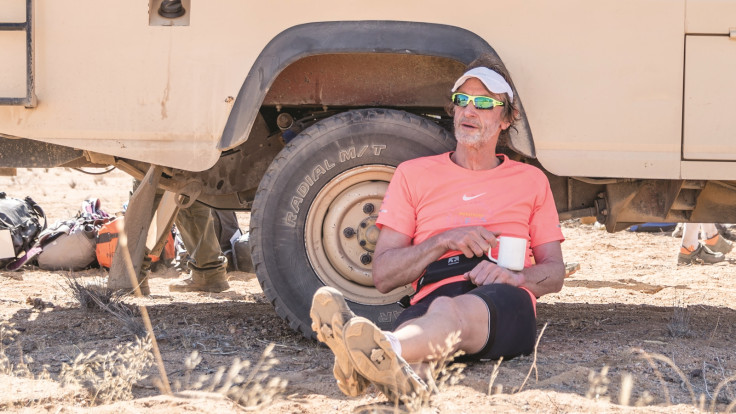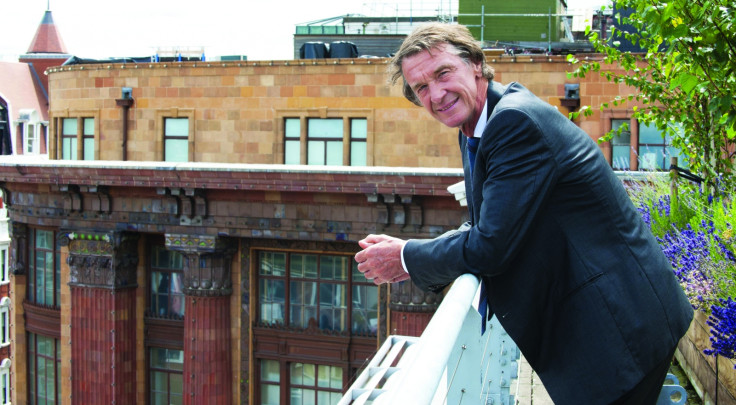New 'King of Scotland': Jim Ratcliffe, the English tycoon who'll soon control vast chunks of North Sea oil
Atop gas fields and Grangemouth refinery, Ratcliffe's Ineos will soon manipulate infrastructure that delivers 40% of North Sea oil and gas.

When oil giant BP agreed to sell its strategic Forties Pipeline System (FPS) for $250m (£200m) to privately-held energy and petrochemicals firm Ineos, the billionaire tycoon Jim Ratcliffe, who founded the independent upstart buying the iconic piece of oil and gas infrastructure, anointed himself the new King of Scotland unwittingly or not.
Scottish nationalists are keen to remind everybody that Edinburgh would do just fine on its oil and gas revenue, free from the shackles of London. It seems Manchester-born Ratcliffe will soon account for a sizeable portion of those "crude" earnings and assets.
The Ineos founder has often stirred things up north. He owns Grangemouth refinery in Falkirk, bought from BP in 2005, and has been widely credited for turning its fortunes around via an audacious move to import US shale gas to revive a facility situated on First Minister Nicola Sturgeon's patch, where she has imposed a moratorium on fracking.
And the FPS isn't a mere pipeline – it is the central infrastructural plank of the North Sea's oil and gas business. The 235-mile system, opened by BP in 1975, links 85 North Sea oil and gas sites, owned by 21 companies, to the UK mainland, and Grangemouth. In 2016, the pipeline's average daily throughput was 445,000 oil barrels per day (bpd) and some 3,500 tonnes of raw gas a day. The system has a capacity of 575,000 bpd.
On completion of the deal, the ownership and operation of FPS, the Kinneil terminal and gas processing plant, the Dalmeny terminal, sites at Aberdeen, the Forties Unity Platform and associated infrastructure including the iconic Hound Point jetties on the Firth of Forth will transfer to Ineos.
And the assets will transfer as fully operational units, at which point Ratcliffe's company will be responsible for a strategic Scottish asset – as Sturgeon would call it – that delivers almost 40% of the UK's North Sea oil and gas.
It is expected that around 300 people that operate and support the FPS business at Kinneil, Grangemouth, Dalmeny and offshore will become part of the Ineos Upstream, a business that acquired the Breagh and Clipper South gas fields in the Southern North Sea from Letter1 in 2015. Both fields collectively currently supply gas to 1 in 10 British homes, but new the Ineos set-up would be supplying 80% of Scotland fuel mix.
That's more than enough to earn Ratcliffe the moniker of the new "crude" King of Scotland. However, the classically-trained chemical engineer-turned-financier and serial industrialist probably prefers being dubbed a maverick rather than seek an inclusion into metaphorical industry royalty. It's that maverick streak that has earned him a place on the Sunday Times rich list as well as the Forbes list of billionaires with a net worth of $9.4bn.
Having founded Ineos in 1998, Ratcliffe used high-yield debt to finance his acquisitions of non-core operations from the likes of BP and doubling their earnings potential over five-year periods, with plants in Belgium, Canada, France, Germany and Italy. Ineos controversially moved its headquarters to Switzerland in 2010 decreasing its tax exposure by nearly £100m a year.

However, being a firm believer in the idea that the UK can make it post-Brexit, Ratcliffe promptly opened his company's UK headquarters in Knightsbridge, London in December 2016, a matter of months after the 23 June referendum when the public voted 52% to 48% in favour of leaving the EU.
Speaking to IBTimes UK at his new UK HQ's launch, Ratcliffe said Ineos had demonstrated its faith in the post-Brexit British economy and was happy to pay "much more tax" than before.
"For me, it was an easy decision. I am optimistic not just about the future of Ineos, but also the future of the UK. Much of this optimism comes from the performance of our UK-based operations. To reflect our growing British businesses, Ineos is now tax resident in the UK. We are at peace with the level of corporation tax [pegged at 19% from 1 April, 2017] levied by the current government."
"I feel the climate for growth and business is very favourable. Ineos will continue to grow both in the UK and worldwide. Britain is a good location to ensure both of these goals."
And if you thought Ratcliffe does not stray beyond the petrochemicals and energy world, then think again. He has made expeditions to the North and South Poles, gone on a three-month-long motorbike trek in South Africa, and has founded a charity Go Run for Fun aimed at encouraging children aged between five and 10 years to get active. He also loves his two superyachts – Hampshire I and Hampshire II – named after the part of England where Ineos was once headquartered.
While that's quite enough to be getting on with, Ratcliffe announced in February his company is prepared to invest "many hundreds of millions" to produce an "uncompromising" off-roader, following Jaguar Land Rover's decision to cease production of its iconic Land Rover Defender.
The bid to build a vehicle was a first for Ratcliffe and a company known primarily for petrochemicals. Commenting on the decision, the Ineos founder, who is fan of the original Land Rover Defender, said: "This is a fantastically exciting project. We want to build the world's purest 4 x 4 and are aiming it at explorers, farmers and off-road enthusiasts across the globe."
The vehicle will not be a replica of the Defender but will reflect its philosophy, offering a real and pure alternative to "the current crop of standardised 'jelly-mould' SUV's," he added. Quite like his pet project, Ratcliffe it seems doesn't fit any mould either.
© Copyright IBTimes 2025. All rights reserved.






















